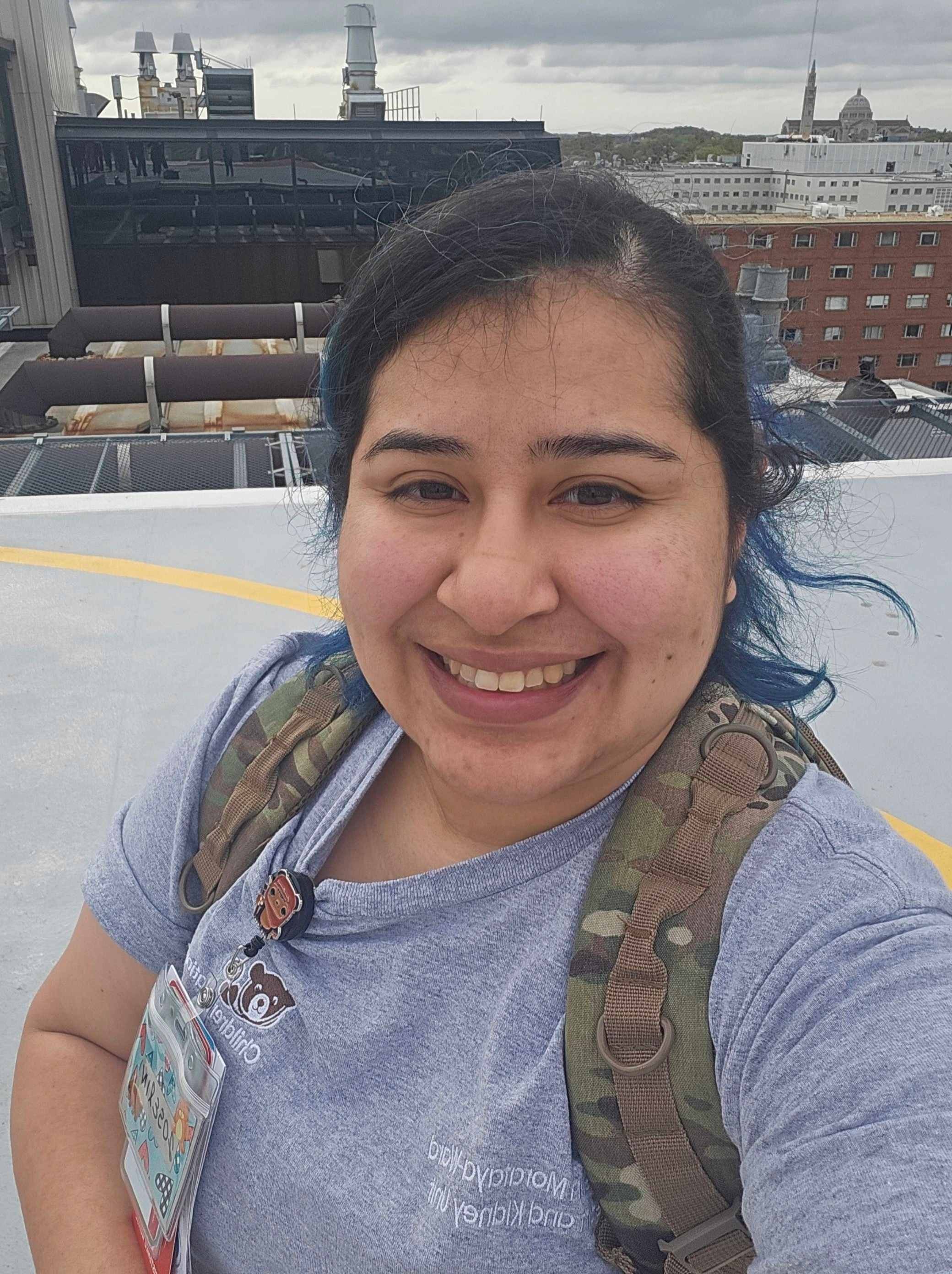For Joselin Morataya-Ward, transitioning from the Air Force to a career in nursing was both a
strategic and heart-driven decision. Her journey into healthcare began with a plan to become a
pediatric surgeon, but her experience and the counsel of loved ones guided her to nursing
instead—a profession she now embraces wholeheartedly. Through the Veterans BSN program at
the George Washington University (GW) School of Nursing, Morataya-Ward found an academic
and community-driven environment that helped her channel her military skills into a fulfilling
nursing career.
Finding Her Calling: A Tactical Approach to Patient Care
Morataya-Ward entered the Air Force with ambitions of medical school, hoping to specialize in
pediatric surgery. Toward the end of her service, she had the opportunity to shadow a doctor and
a nurse, which was a turning point. “I realized I thrive in tactical environments and love direct
interactions with patients,” she shares. Nursing offered her precisely that—a chance to engage in
hands-on patient care, witness their progress, and be present in each step of their healing process.
“Being a nurse is incredibly rewarding, and my husband’s encouragement toward nursing instead
of medical school helped me see this was my true path.”
With an Associate Degree already under her belt and partially completed coursework in pre-med,
Morataya-Ward sought an accelerated nursing program that would accept her prior credits. GW’s
program was the perfect fit. “The GI Bill and Yellow Ribbon Program covered my entire tuition,
which meant I could graduate debt-free,” she explains. Additionally, GW’s veteran-friendly
approach, including the presence of fellow veterans in her classes, made it an ideal place to
transition from military to civilian life.
Military Influence on Nursing Practice
The lessons Morataya-Ward learned in the Air Force have deeply influenced her nursing
practice. “The military instilled in me the importance of time sensitivity, following the chain of
command, and working as a team to accomplish a common mission,” she says. “In nursing, that
mission is advocating for our patients and supporting them through their care.” Her approach
emphasizes integrity, clear communication, and teamwork—skills that were honed during her
service.
Morataya-Ward’s time in the military also instilled in her a sense of responsibility and dedication
to her patients, striving to answer their questions, be honest with them, and support their
families. “The ability to be direct with patients and maintain a positive attitude throughout their
care journey is something I’ve brought with me from my time in the service,” she says. Her
military experience has not only made her a disciplined and reliable nurse, but has also enriched
her relationships with patients, who trust her sincerity and commitment to their well-being.
Navigating the Accelerated Program’s Challenges
The intensity of GW’s accelerated BSN program came with its own set of challenges,
particularly with the amount of information and limited time available. Having always been a
high-achieving student, Morataya-Ward found adjusting to the accelerated pace difficult at first.
“Getting my first low grade was humbling,” she recalls. The shift from online learning, which
she experienced during the COVID-19 pandemic, to in-person classes also required adjustment.
Yet, with resilience and the support of her peers and mentors, she persevered.
Morataya-Ward credits much of her success to her veteran peers, with whom she formed a study
group. “The veterans in my group were going through the same challenges, and they understood
the rigor of the program,” she says. “It started as a study group and ended with friendships that
span miles.” One faculty mentor, herself a veteran, guided Morataya-Ward from her first to her
last semester, providing a constant source of support and encouragement.
A Community That Honors Veterans
For Morataya-Ward, the support from GW’s School of Nursing extended beyond academics.
Unlike other institutions, GW recognized her military-earned credits, allowing her to avoid
retaking classes. “Seeing how few nursing schools accommodate veterans was disheartening,”
she shares. “It was a relief to feel supported by a school that values our experience and allows us
to start our careers quickly.”
The GW community created a welcoming environment for its veteran students by providing
events, a dedicated lounge for studying, and visible recognition within the school. “Small things
count for us,” she notes, “because in the military, we’re taught that the little things matter.”
Having professors and staff who were veterans themselves fostered a sense of camaraderie and
appreciation, reinforcing that Morataya-Ward had chosen the right place for her nursing
education.
Advice for Fellow Veterans: Build a Support Network
Reflecting on her journey, Morataya-Ward offers advice to veterans considering a similar path:
“Create a small group to help you get through this fast-paced program. Going through it alone is
tough, but with a great group of friends, you won’t even feel the time passing.” She also stresses
the importance of open communication with professors, who she found eager to help students
succeed.
Financial assistance is another key consideration for veterans entering accelerated programs.
Morataya-Ward recommends the William and Joanne Conway Transitioning Warrior Nursing
Scholars Initiative for veterans at GW, which provided vital support during her studies. “I was
the primary income earner in my household, and the scholarship helped ease our financial
burden,” she says. For veterans facing similar challenges, she encourages applying for
scholarships before and during their studies.
Looking Ahead: A Career Rooted in Service
Today, Morataya-Ward is not only proud of her accomplishments, but also feels fulfilled in her
role as a nurse. Her journey from the military to nursing has been shaped by a commitment to
serve, a strong support network, and the resilience developed during her years in the Air Force.
With the skills and discipline she’s carried into nursing, she’s prepared to make a meaningful
impact on her patients and her community.


